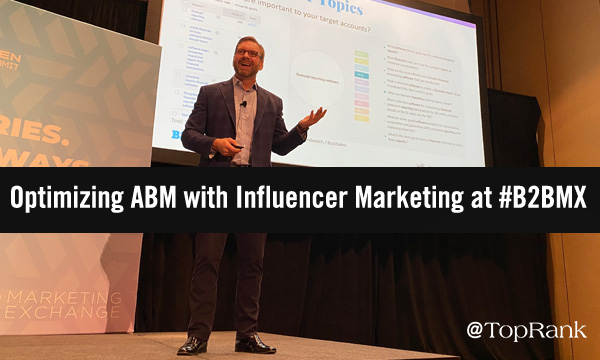
 Account based marketing (ABM) is the hybrid sales/marketing/revenue discipline that is shaking up the status quo for marketers and sales pros alike. There are as many definitions of ABM as there are accounts to target, but I’m partial to this one from LinkedIn’s Megan Golden:
Account based marketing (ABM) is the hybrid sales/marketing/revenue discipline that is shaking up the status quo for marketers and sales pros alike. There are as many definitions of ABM as there are accounts to target, but I’m partial to this one from LinkedIn’s Megan Golden:
“ABM is a strategy that directs marketing resources to engaging a specific set of target accounts. Instead of casting a wide net with their lead-generation efforts, marketers using ABM work closely with sales to identify key prospects and then tailor customized programs and messages to the buying team within target accounts.” Megan Golden, Group Manager, Global Content & Social Media Marketing, LinkedIn*It’s all about earning the trust of — and ultimately influencing — members of specific buying committees. In other words, it’s the distillation of what all B2B marketers should be doing. Or as Sangram Vajre, CEO of Terminus, put it (embroidered on his sneakers, no less):
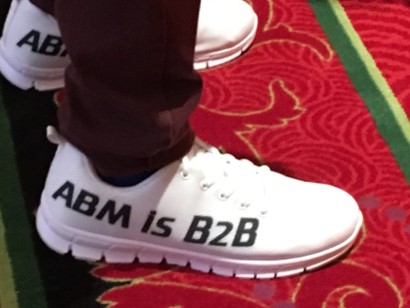 Marketers who practice ABM are seeing impressive results. A recent report from ITSMA and the ABM Leadership Alliance found that 73% of marketers plan to increase ABM budgets in the coming year, and 71% saw greater ROI compared to traditional marketing. Yet as much success as marketers are seeing with ABM, most are missing a crucial part of the strategy: Building trust through external influence. In his B2BMX presentation, Lee Odden observed that ABM marketers tend to focus on internal influence — which members of the buying committee have a say in the purchase decision. But…
Marketers who practice ABM are seeing impressive results. A recent report from ITSMA and the ABM Leadership Alliance found that 73% of marketers plan to increase ABM budgets in the coming year, and 71% saw greater ROI compared to traditional marketing. Yet as much success as marketers are seeing with ABM, most are missing a crucial part of the strategy: Building trust through external influence. In his B2BMX presentation, Lee Odden observed that ABM marketers tend to focus on internal influence — which members of the buying committee have a say in the purchase decision. But… 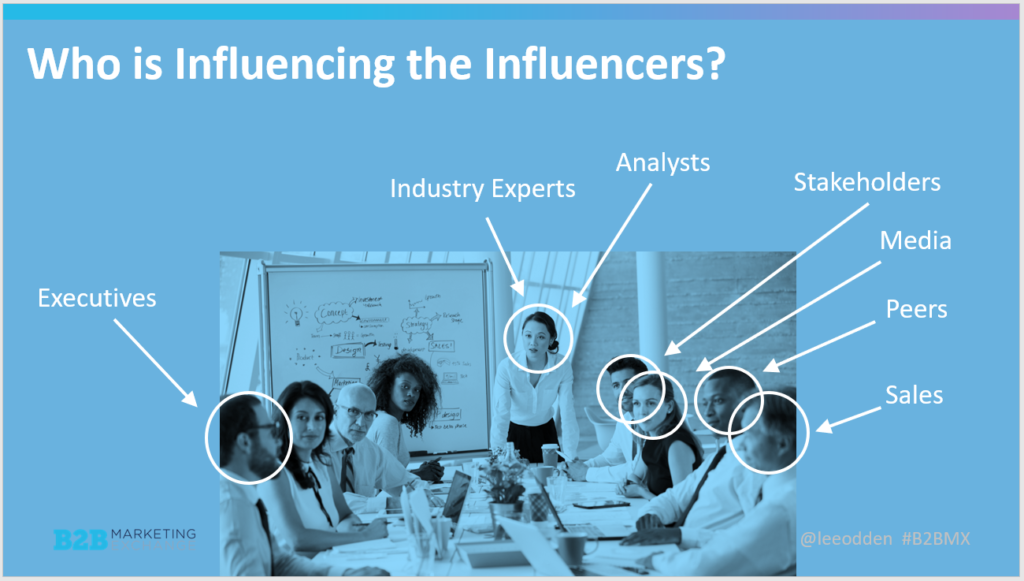 Here’s what is possible when B2B marketers include influencer marketing in their ABM strategy.
Here’s what is possible when B2B marketers include influencer marketing in their ABM strategy.
Influence in ABM: It’s All About Trust
According to Lee, “Trust is one of the most paramount matters in marketing today.” If buyers don’t trust your brand, it’s hard to even get a message through, let alone close a sale. The problem is, buyers overall don’t trust brands. In the CSO Insights report from Marketing Charts, brands were near the bottom for trust: And who is at the top of the list? Subject matter experts from the industry or third parties. These are the people your audience wants to hear from...which means they’re the voices you want to highlight in your content. [bctt tweet="“Trust is one of the most paramount matters in marketing today.” @LeeOdden" username="toprank"]
And who is at the top of the list? Subject matter experts from the industry or third parties. These are the people your audience wants to hear from...which means they’re the voices you want to highlight in your content. [bctt tweet="“Trust is one of the most paramount matters in marketing today.” @LeeOdden" username="toprank"]
Dell Outlet Builds Trust & Brand Awareness with B2B Influence
For his first example of the power of influence in B2B, Lee shared a success story from Dell Outlet*, a 2020 Killer Content Award Finalist. Dell Outlet needed to build awareness as an entity distinct from their parent brand. With a focus on refurbished hardware and a commitment to a more sustainable, circular economy, Dell Outlet has a unique personality, purpose and value proposition. But they needed to both establish themselves as their own brand, and educate a small business audience on the value of refurbished equipment. With targeted research and outreach, Dell Outlet was able to connect and co-create content with small business influencers that had relevance and resonance with the brand’s target audience. The full campaign, featuring videos, a landing page, and social promotion, achieved amazing results that were only possible with influencer marketing: Of particular interest is that the campaign was 175% over goal for traffic to product pages. Even though this was primarily an awareness campaign, the influencer contributions actually drove conversions. That’s a powerful testament to how successfully the campaign built trust with its target audience.
Of particular interest is that the campaign was 175% over goal for traffic to product pages. Even though this was primarily an awareness campaign, the influencer contributions actually drove conversions. That’s a powerful testament to how successfully the campaign built trust with its target audience.
Cherwell Employs Influence Across the Customer Lifecycle
For his next example, Lee shared a success story from software company Cherwell*. Their story highlights the importance of a diverse influencer mix to appeal to buyers across the lifecycle, from awareness to engagement to decision. Cherwell needed to create awareness around their brand, build trust with IT executives, and ultimately drive leads and sales. This full-funnel approach required different types of influencers for each stage: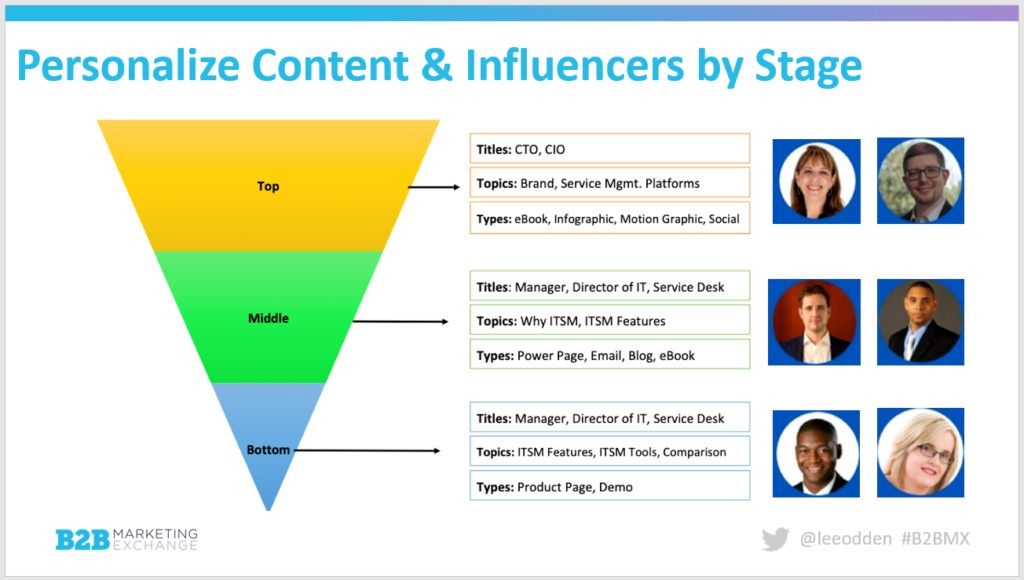 At the top of the funnel, brandividuals with large networks and enthusiastic audiences help drive awareness. Further down, subject matter experts add even more substance to the conversation, contributing to meatier content. Finally, at the bottom of the funnel, brand advocates help with the final push to conversion. This type of strategic co-creation, with influencers at every stage of the funnel, generated unbelievable results for Cherwell. The campaign achieved over 400% more social reach than any previous campaign, and influenced 22% of their sales pipeline for the year.
At the top of the funnel, brandividuals with large networks and enthusiastic audiences help drive awareness. Further down, subject matter experts add even more substance to the conversation, contributing to meatier content. Finally, at the bottom of the funnel, brand advocates help with the final push to conversion. This type of strategic co-creation, with influencers at every stage of the funnel, generated unbelievable results for Cherwell. The campaign achieved over 400% more social reach than any previous campaign, and influenced 22% of their sales pipeline for the year.
ALE Creates a New Industry Award
Lee’s final example shows just how powerful influencer marketing can be not only for awareness, engagement, and conversion, but also for creating goodwill among influencers, prospects, and customers. Alcatel Lucent Enterprise (ALE)* wanted to raise awareness and add credibility with prospects to accelerate sales discussions. Their solution: With the help of influencers, create a new award to honor and uplift the IT professionals in their target audience. The 2020 IT Vanguard Awards started by selecting judges, influencers in the IT space, as well as a subject matter expert from ALE. These judges shared their thoughts on what qualities defined the best IT leaders. Then ALE asked their target audience to nominate their co-workers and peers for the award.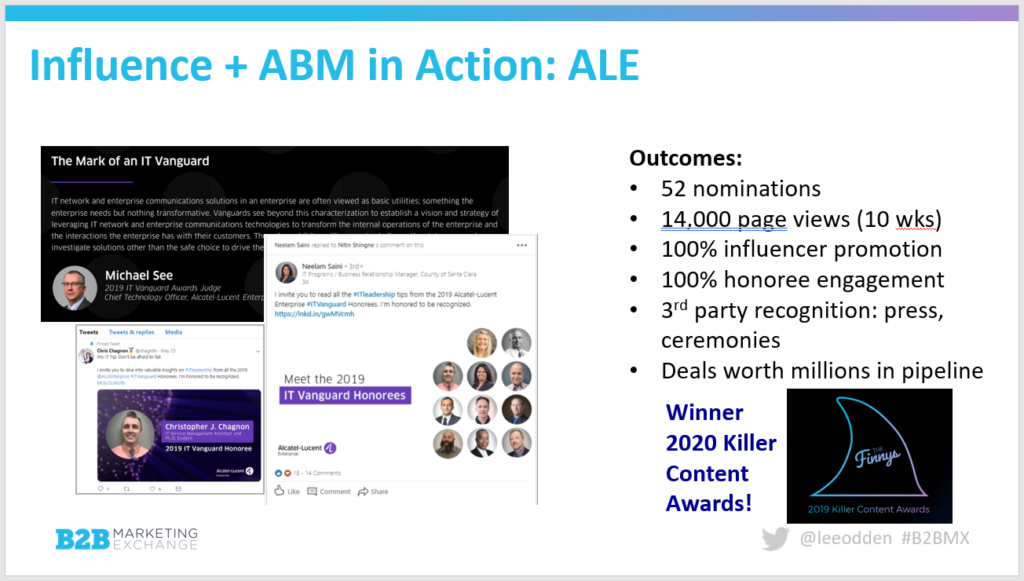 The resulting campaign saw unprecedented levels of engagement and influencer promotion for ALE, along with earned media reporting in industry publications. The resultant flood of goodwill from IT professionals firmly established ALE’s credibility and added deals worth millions of dollars to their pipeline. And for a finishing touch, the campaign won ALE an award of its own: A Killer Content Award (“Finny”) for 2020.
The resulting campaign saw unprecedented levels of engagement and influencer promotion for ALE, along with earned media reporting in industry publications. The resultant flood of goodwill from IT professionals firmly established ALE’s credibility and added deals worth millions of dollars to their pipeline. And for a finishing touch, the campaign won ALE an award of its own: A Killer Content Award (“Finny”) for 2020.
Optimizing ABM with Influencer Marketing
Looking to get some of those results for yourself? Lee offered a 5-step plan to integrating influencer marketing into your ABM strategy: #1: Find Your Ideal Customer Topics. Use tools like SEMrush, Brandwatch and BuzzSumo to identify your customers’ burning questions — and how they search for answers. Seek out the topics that align with your brand’s expertise and your customers’ need to know. #2: Find Your Ideal Customer Influencers. With the help of tools like Traackr, identify the people who are influential about your topics. You’re looking for those who care about these topics, whose audience cares about them too, and who are regularly publishing content. #3: Identify, Qualify and Recruit. The three key considerations for an influencer are:- Popularity: How large of a following does the influencer have?
- Resonance: How well does the influencer actually move their audience to take action?
- Relevance: How closely aligned is the influencer’s output with your values, audience, and topics?
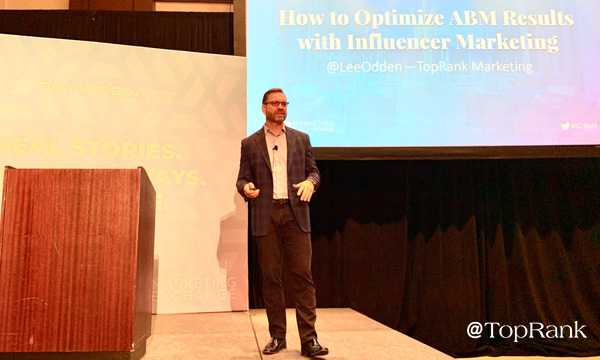
Understanding Influence, Influencing Understanding
In closing, Lee urged account-based marketers to include influencer marketing in their ABM strategy. In addition to your brandividuals, advocates, and experts, he also recommended adding prospects into your influencer mix. Promote your most valued potential customers right alongside leaders in the industry, help them become influential, and you can begin a mutually profitable relationship. Is influencer marketing part of your B2B marketing mix? Whether you’re running multiple campaigns, or just thinking about testing the waters, we want to hear from you. Take our quick B2B Influencer Marketing Survey to share your experience, and have a chance to win a $500 Amazon gift card!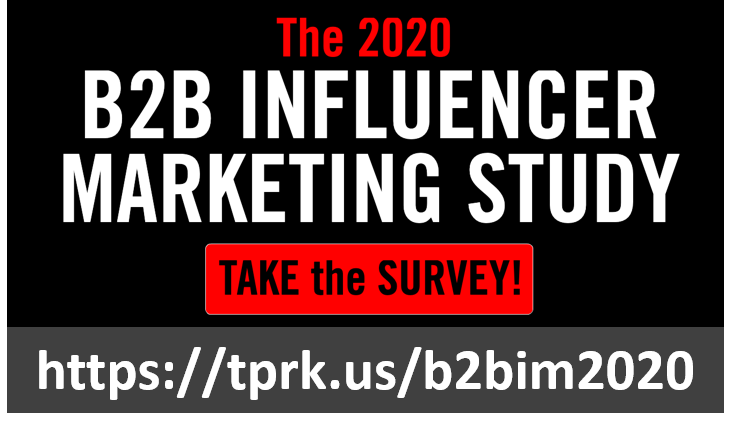 * LinkedIn, Dell Outlet, Cherwell, and Alcatel Lucent Enterprise are TopRank Marketing clients.
* LinkedIn, Dell Outlet, Cherwell, and Alcatel Lucent Enterprise are TopRank Marketing clients.
The post Optimizing ABM with Influencer Marketing at #B2BMX appeared first on Online Marketing Blog - TopRank®.
from Online Marketing Blog – TopRank® https://ift.tt/398cqOA
via IFTTT
No comments:
Post a Comment